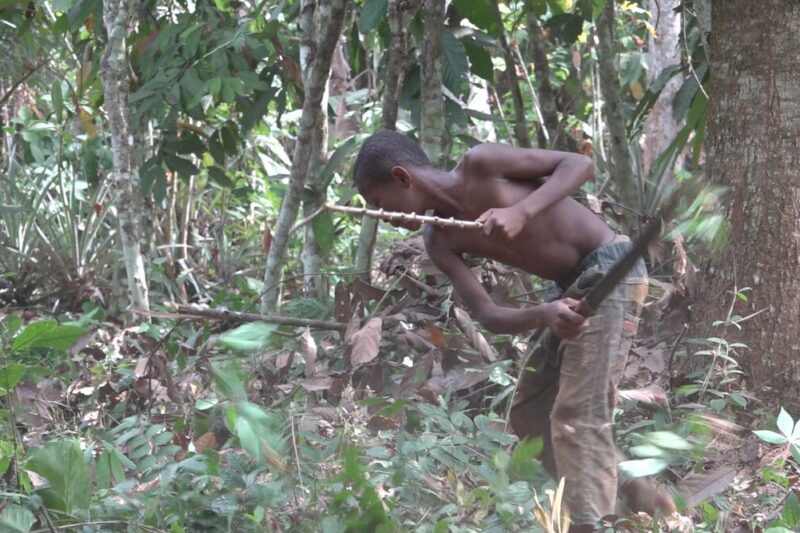Mondelēz faces claims of cocoa sector child labour in Ghana with Channel 4 documentary

pic: Channel4
Mondelēz International has come under fire in a UK Channel 4 television documentary uncovering cases of cocoa sector child labour allegedly linked to the business in Ghana – which the company has stressed is against its policies, writes Neill Barston.
In the company’s ‘Dispatches’ programme screened earlier this week, investigative team of journalists from the British news stations approached farming operations connected to the US-headquartered confectionery group’s Cocoa Life initiative.
It found instances of children as young as 10 involved with hazardous farming activities including the use of machete to farm cacao, and heard first hand from youngster who had injured themselves while working for farming operations – often assisting older family members.
The Channel 4 documentary focused on cocoa being supplied to the Cadbury brand, and approached parent company Mondelez’s CEO Dirk Van De Put for comment on its findings, but he declined to appear as part of its recordings. But the company responded in a written statement that it was ‘deeply concerned’ by the allegations within the programme, stating that it is actively working towards improving conditions for farming communities in the region.
As Confectionery Production has previously reported on extensively, official research has shown that a total of 1.5 million children remain exposed to hazardous labour in the cocoa sector across Ghana and neighbour Ivory Coast, despite the efforts of major confectionery businesses including Mondelez, Barry Callebaut, Mars and Nestle, working with civil organisations including the World Cocoa Foundation and the region’s governments.
The documentary highlighted the fact that many smallholder farmers, who make up the backbone of the cocoa sector in the region are unable to afford to pay adult farm labourers.
This in turn has led to a cycle of young family members being recruited to assist with agricultural duties – including some of the most arduous manual labour, at the expense of missing vital schooling opportunities.
In Ghana itself, which was the focus of the TV documentary, the legal employment age is from 16, and it is illegal to employ those below 14 in potentially hazardous work, which the manual aspects of cocoa-based agriculture fall within.

pic: Channel4
Poverty wages
As the documentary noted, farmers it interviewed were earning around £500 a year, well below UN-defined poverty levels, which continues to be at the heart of the issue of child labour.
Presently, farmers only receive around 11% of the value of cocoa, with large percentages going to retailers, distributors, as well as profits returned to cocoa and chocolate companies.
With the past two years, governments in Ivory Coast and Ghana have set up a Living Income Differential payment scheme of $400 per tonne paid to farmers, but issues over poor crops, and logistics chains impacted by Covid-19 and a reduced farmgate prices paid directly to farmers have all impacted to create further pressure on child labour issues within the region.
Responding in the wake of the documentary, Mondelēz released a statement on its practices.
As previously reported, last summer, the company was one of a number of major businesses operating in West Africa including Ferrero, Tony’s Chocolonely and Mars, calling for EU due diligence for supply chains, aiming to significantly improve overall transparency within supply chains. This legislation is now being actively taken forward by the EU Commission.
In its statement, Mondelēz said: “We are deeply concerned by the incidents documented in the Dispatches programme. We explicitly prohibit child labour in our operations and have been working relentlessly to take a stand against this, making significant efforts through our Cocoa Life programme to improve the protection of children in the communities where we source cocoa, including in Ghana.
“The welfare of the children and families featured is our primary concern, and we commit to investigating further so we can provide any support needed. As part of our Cocoa Life programme, we have Child Labor Monitoring and Remediation Systems in place in Ghana which means community members and NGO partners are trained and ready to provide assistance to vulnerable children, and once identified, we can help to address any cases of child labour.
“But to do this, we need the production team to share the additional information we have requested – such as dates, names and locations – so that we can act with the urgency required. With this information we can use the tools at our disposal to investigate and, if validated, work with the proper authorities to help the children.”
The business added that across Ghana, there are approximately 81,000 farmers that participate in the Cocoa Life programme, and stressed that it would be taking up any allegations made by Channel 4.
Its statement added: “Despite the absence of the details (such as names and locations etc.) that we had requested from the production company, we have notified the authorities in Ghana of the allegations contained in the film and engaged our partners on the ground to redouble their efforts, including through the Child Labor Monitoring and Remediation System.
“These efforts include in-depth interviews with farmers and children, using the Ghana Child Labour Monitoring System; tracking of school enrollment and attendance through school registers; and continuing with awareness creation and sensitisation on child rights in the local communities and hamlets.”
